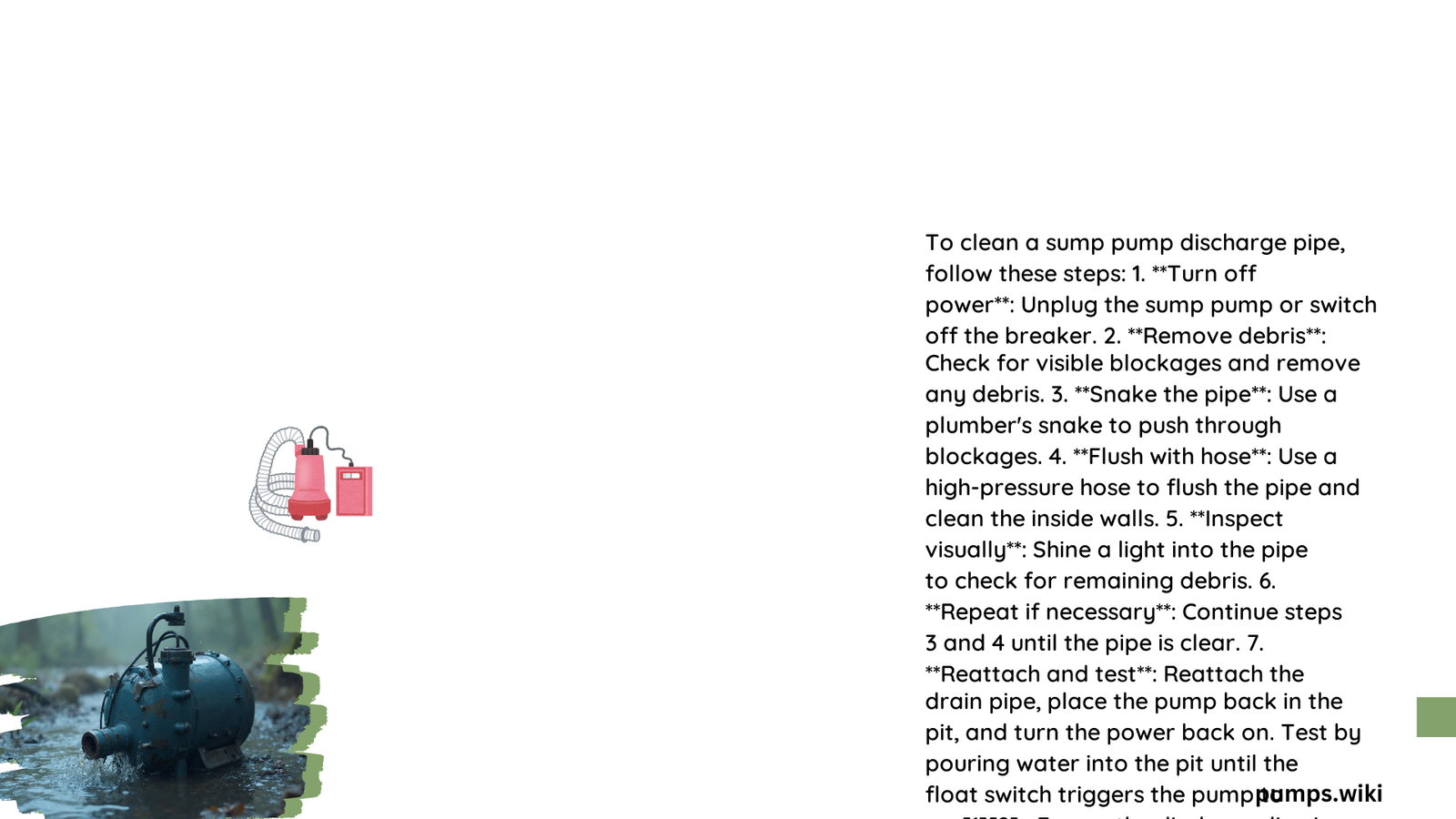Sump pump discharge pipe cleanout is a critical maintenance task that prevents water damage and ensures your basement remains dry. Homeowners must understand the precise techniques to remove blockages, clear debris, and maintain optimal water flow through the discharge line. This comprehensive guide will walk you through professional-grade methods to effectively clean and maintain your sump pump discharge pipe, protecting your property from potential water-related issues.
Why Is Sump Pump Discharge Pipe Cleanout Critical?
Sump pump discharge pipe cleanout prevents potential basement flooding by ensuring unobstructed water drainage. Blockages can cause significant problems, including:
- Water backup into the basement
- Pump motor strain
- Potential system failure
- Increased risk of water damage
What Tools Do You Need for Cleanout?
| Tool | Purpose | Estimated Cost |
|---|---|---|
| Plumber’s Snake | Breaking through blockages | $20-$50 |
| Garden Hose | Flushing pipe | $10-$30 |
| Wet/Dry Vacuum | Optional debris removal | $50-$150 |
| Screwdriver/Wrench | Disconnecting pipes | $10-$25 |
Step-by-Step Sump Pump Discharge Pipe Cleanout Process

How to Prepare for Cleanout?
- Safety First
- Disconnect power to sump pump
- Wear protective gloves
-
Prepare workspace with plastic tarp
-
Initial Inspection
- Locate discharge pipe
- Check for visible external blockages
- Assess pipe condition
What Are the Detailed Cleanout Steps?
Disconnection and Access
- Carefully unscrew or unclamp discharge pipe
- Inspect connection points for damage
- Create clear access to pipe interior
Blockage Removal Techniques
- Insert plumber’s snake slowly
- Rotate snake to break through obstructions
- Apply gentle but consistent pressure
- Remove snake and check for debris
Flushing and Verification
- Use garden hose to flush pipe thoroughly
- Check water flow and clarity
- Ensure complete debris removal
How Often Should You Perform Cleanout?
Recommended cleanout frequencies:
– Annually in normal conditions
– Twice yearly in high-moisture environments
– Immediately after significant flooding events
– Before winter in cold climate regions
Common Discharge Pipe Blockage Causes
What Creates Pipe Obstructions?
- Accumulated sediment
- Organic debris (leaves, roots)
- Mineral deposits
- Ice formation
- Small animal nests
- Pipe misalignment
Professional Maintenance Tips
How to Prevent Future Blockages?
- Install protective screens
- Ensure proper pipe slope
- Use check valves
- Regular visual inspections
- Consider pipe insulation in cold regions
Potential Complications and Solutions
What If Simple Cleanout Doesn’t Work?
- Professional camera inspection
- Potential pipe replacement
- Check for underground pipe damage
- Evaluate overall drainage system
Cost Considerations
What Are the Potential Expenses?
- DIY Cleanout: $20-$100
- Professional Service: $150-$500
- Pipe Replacement: $500-$2,000
Warning Signs of Discharge Pipe Problems
How to Recognize Potential Issues?
- Slow water drainage
- Unusual pump noises
- Water pooling near foundation
- Increased pump cycling
- Visible pipe damage
Final Recommendations
Consistent maintenance and proactive cleanout prevent costly water damage. Invest time in regular inspections and address issues promptly to protect your home’s foundation and basement.
Pro Tips
- Document your maintenance schedule
- Keep detailed repair records
- Consider professional annual inspection
References:
– Bienvenu Brothers Sump Pump Guide
– Buckeye Heat Discharge Line Tips
– Robinson Plumbing Maintenance Guide
